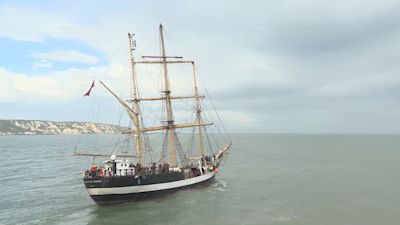Plastic pollution: Ship sets sail to uncover the damage plastic has on marine life

Video report by ITV News Meridian's Malcolm Shaw
A ship has set sail from Kent on a voyage of discovery around the coast of the UK.
Aboard the Pelican of London is a team of scientists hoping to uncover the damage plastic pollution is having on our marine life.
They will spend the next three months visiting major ports and remote islands in their quest.
The Pelican of London is modelled on HMS Beagle, the ship which took naturalist Charles Darwin on his ground-breaking voyage around the world in the 1830s.
But the Pelican of London is charting an environmental emergency of the rising tide of plastic, and how it is polluting the oceans and damaging marine life.
The tall ship left Folkestone on Monday (17 May) at the start of a thirteen-week voyage to discover the full extent of the problem, arriving in Poole on Tuesday.
Stephanie Lavelle from the Sea Sanctuaries Trust says: "We'll be doing coastal surveys of beaches and subsea surveys. We'll be doing sediment core sampling to look at micro-plastics accumulation in the seabed habitats.
"We'll also be doing observations from the vessel, so we'll be looking floating plastic accumulation."
The plastic washed up on our beaches is only a tiny proportion of what is out at sea.
The project will circumnavigate the UK, taking in some the biggest ports but also the most remote and uninhabited islands.
It's a joint venture between plastic pollution campaigners City to Sea, and Darwin 200, an environmental research organisation.
Data being gathered will be beamed live from the ship and posted online.
As well as monitoring pollution from single-use plastics, the scientists aboard will monitor whales, dolphins, fish and seabirds.
The expedition is a warm-up for a two-year voyage around the world, to train the planet's top young conservationists, and help protect our extraordinary marine environment for future generations.